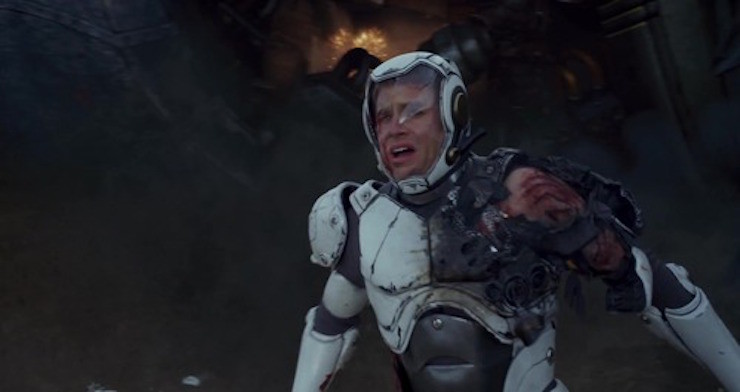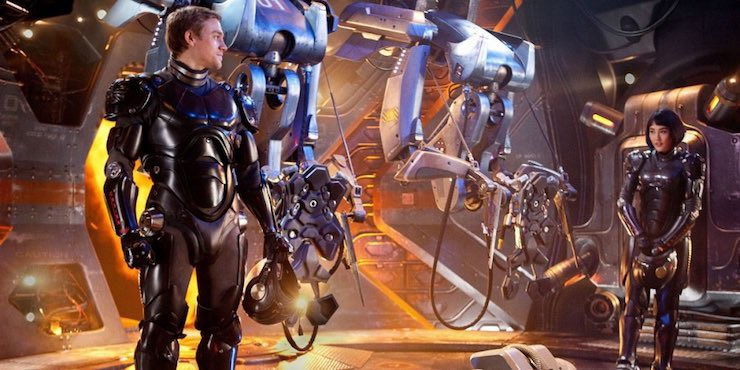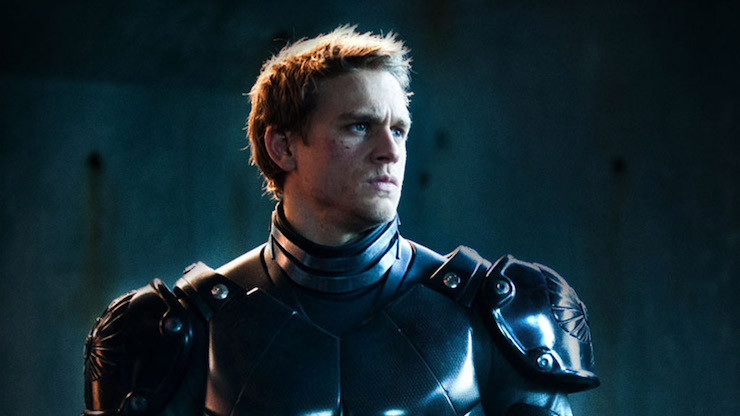Charlie Hunnam, soon to be Lad King Arthur for Guy Ritchie and former Son of Anarchy, will not be returning for Pacific Rim 2. It’s, by all accounts, a genuinely amicable thing that’s been on the cards for some time. Hunnam talked about how earlier drafts of Pacific Rim: Maelstrom focused heavily on his character (Raleigh Becket), but as the schedule locked in it became apparent that he wouldn’t be able to return.
It’s a shame, as Hunnam’s always good value and I rather liked Raleigh. But the fact the movie can go on without him is also a testament to just how interesting and versatile a world the Pacific Rim films have built.
So, like a kid eating their veggies first, let’s take a look at the downside of Hunnam not returning. It’s a loss because he’s a very weird, and rather clever, leading man for a blockbuster. I know Hunnam caught more than his fair share of flak for a fairly broad performance, but the more you look at it, the more you see the interesting layers given to the character by both his performance and the script.
Let’s tackle the broad element first. His early scenes in particular present Raleigh as a taller, blonder, less Scientology-y Maverick from Top Gun. He’s all go, no quit—a Kaiju-punching rockstar as in love with the idea of his job as he is with the job itself. He’s basically a Jaeger-piloting Newt, a full-bore fanboy whose life is defined by the monsters he fights and kills.
And then he loses.
In the worst, most traumatic way possible.
Raleigh’s path through the rest of the movie is somewhere between an old gunslinger called out of retirement and Rocky in Rocky III. In both cases, a lead with absolute faith in their abilities is given rock-solid proof that someone else is better than they are. In both cases, the characters have to completely reinvent themselves in order to survive.
This is all pretty cookie-cutter stuff, but it’s also the point where Pacific Rim gets specific and gets surprising in short order. Raleigh is oddly serene, a man who has faced the absolute worst thing that can happen to him and come out the other side. He is very, very far from okay, but at the same time he’s also pretty much unflappable. He’s one of only two people in history to solo-pilot a Jaeger and live. After that, everything’s pretty small potatoes.

It’s a really interesting direction to take the character, especially as he isn’t arrogant about it. In fact, Raleigh comes across like a lot of serious illness or accident survivors I’ve met: always braced just a little bit for impact but also always pleasantly surprised that whatever they’re going through isn’t as bad as what they’ve been through. He has the same calm; the same grounded, quiet pragmatism, and it’s there in every aspect of the character. His quiet manner of speech, his acceptance of very nearly everything, even the fact he and Mako don’t kiss in the final scene. That last scene, in particular, could either be read as Raleigh being numb to anything outside his own head or, more plausibly, as Raleigh knowing Mako’s boundaries. They’ve been inside each other’s heads. You don’t get more intimate than that.
It’s also worth noting that Raleigh is one of the very first gunslingers of this type who finds his way through his long dark night of the soul by—literally and metaphorically—trusting and embracing his feminine side.
So with all that in mind, it’s a real shame he won’t be back. In many ways Raleigh is Stacker Pentecost’s logical heir: they have shared trauma, shared respect, and both men have that same feet-on-the-ground pragmatism. It would have been really interesting to see how Raleigh had adapted to a world at peace, or whether he’d moved up in rank to be Herc’s 2IC. How calm can you be when your world is ripped apart for a second time? How can you still have faith in your own fundamental endurance when you went through Hell and now Hell has come back for you? Lots to work with there.
Or is there?
John McClane, Connor MacLeod, Sarah Connor, Ellen Ripley. Four of the greatest characters popular cinema has created in the last hundred years. The original Die Hard redefined action movies, the original Alien remains a near unassailable SF classic (as do at least two of its sequels), and the first Terminator story (which I’d argue is comprised of T1 and Judgment Day) is positively epochal. Plus the original Highlander and the magnificently eccentric TV show that followed it remain two of the best, oddest, and earliest examples of mainstream contemporary urban fantasy you can find.
Then there’s Die Hard V: The Russia-Punching.
And Highlander II: The Dumpster Fire.
And Terminator III: Rise of the Female Terminator-As-Designed-By-a-15-Year-Old.
And whatever the hell Alien Resurrection became, as the latest titular alien dragged itself, half-formed, from the egg and intoned a single, garbled “…MAMA” before being blown out the airlock.
The point is all of these characters have legs, all of them have starred in multiple good movies (HIGHLANDER 3 IS MUCH LESS AWFUL THAN 2. Mostly. Let’s move on.) but none of them have starred in universally successful, universally critically-acclaimed strings of movies.
Because no one does. Stories end. That’s a feature, not a bug. Great stories know when to get off the stage, and nailing that landing is often the most important part of the whole enterprise. A good ending can be glorious, life-affirming…joyous, even. Witness the Ninth Doctor’s farewell to Rose (but delivered practically into the camera): “You were fantastic. And you know what? So was I!”
So while there are plenty of potential angles that might have worked for Raleigh, I’m really glad Maelstrom won’t be doing them. He’s earned his rest, his story is done, and it’s someone else’s turn.

And that, when it comes down to it, is why this development is really good news. Pacific Rim has been quietly demonstrating that it’s larger than a single character for a while now. The flawed but interesting Tales from Year Zero graphic novel did a great job of exploring the immediate aftermath of the Trespasser Event whilst recent series Tales from the Drift is the surprisingly touching story of the last mission one pair of Tacit Ronin pilots took on. Even the original movie itself is rife with implied and hidden stories: look at the other wildly individualistic Jaeger crews or the echoing halls of the mostly abandoned Shatterdome. This is a world, as podcaster Alex Shaw has pointed out, that’s built on hundreds of stories, hundreds of lives. Raleigh was, and always will be, a vital part of that, but he wasn’t the first and it makes sense that he isn’t the last.
Finally, there’s both an in-universe and out-of-universe extra bonus reason why this is good news. The in-universe reason is canon but has yet to be explored in the movies: the Drift. Even if Raleigh isn’t dead, the fact that he’s drifted means that there’s an imprint of him in there. Any other pilot will be able to access that imprint, and several of the behind-the-scenes books have talked about the idea of the Drift as a kind of ancestral wisdom databank. It’s almost certainly the way they’ll bring Stacker back for a cameo.
The out-of-universe reason ties back to Stacker and, more specifically, who he is and where he’s from. The confirmation that John Boyega is the new lead is excellent news, as we’ve talked about before. It also opens the movie up to entirely different cultural perspectives. A young black man from London who clearly had a complicated relationship with his dad is going to have a massively different way of doing things from a young white American who lost his brother in the Drift. We don’t know yet whether Boyega will be partnered with the excellent Rinko Kikuchi as Mako Mori, but hopefully that’s the case. Not only is that a very different, and welcome, pairing to anchor the movie, but it offers some interesting progression for Mako, becoming senior pilot and working with a man who is as untempered as she once was and who evokes good, but very complicated, memories for her. There’s a hugely complex emotional landscape for the movie to cover and that, along with the return of building-sized war suits engaging in some serious monster-punching, sounds like it’s going to be massive fun. Literally.
So here’s to Raleigh Becket, whose watch is ended. His story will always be one of my favorites and the grace he showed in bowing off the stage leaves it open for something new, different, interesting, and almost certainly equipped with a chain sword and elbow rockets. Thanks, Ranger.
Alasdair Stuart is a freelancer writer, RPG writer and podcaster. He owns Escape Artists, who publish the short fiction podcasts Escape Pod, Pseudopod, Podcastle, Cast of Wonders, and the magazine Mothership Zeta. He blogs enthusiastically about pop culture, cooking and exercise at Alasdairstuart.com, and tweets @AlasdairStuart.










